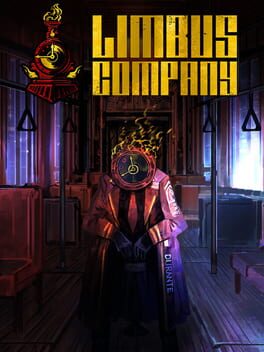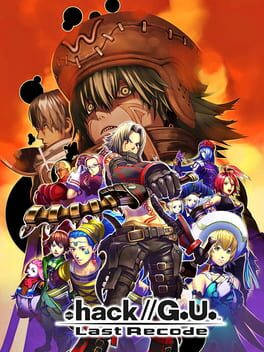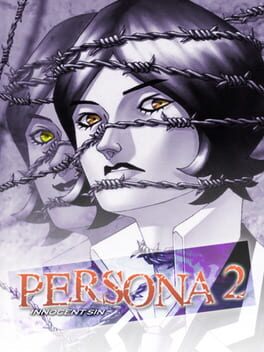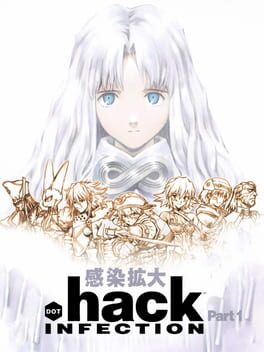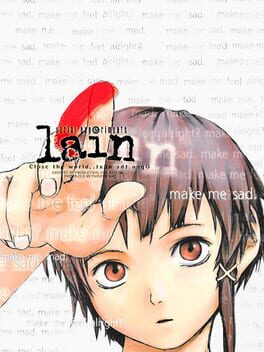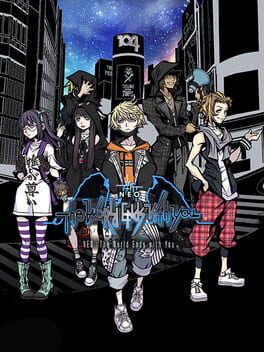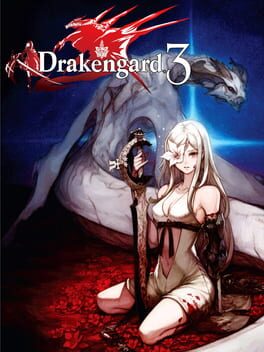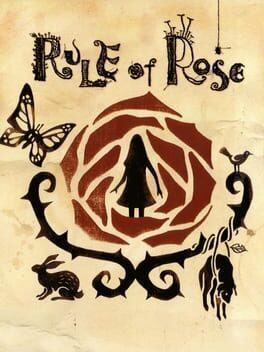Azuri
10 reviews liked by Azuri
Limbus Company
2023
i consider myself a .hack//fan. .hack//SIGN is probably tied for my favorite anime, tsukasa is probably tied for my favorite character of all time, and i've gone through every piece of .hack//R:1 (including those god awful light novels) because of how much of a joy it was to piece together the story and slowly form a more cohesive understanding of the world and the mystery hiding beneath its surface.
that said, i think that basically everything released after .hack//R:1 completely lacks the, for lack of a better word and fully cognizant of the cliche of phrasing it this way, "magic" that makes .hack// what it is to me. every piece of the original story arc is defined by an ethereal atmosphere, a heavy emphasis on video games and the internet as a unique framing device for character studies, and the game only rarely being treated as anything more than, well, a game. sure, tsukasa becomes trapped inside the world and as a result his struggles within are much more real, but they mostly reflect in the pain he feels as a result and the isolation that comes with being the only person who can't log out, can't make connections outside of the game, can't open his horizons up and see what lies beyond the confines of his safety net.
the stakes within the game in .hack//’s first generation are more than anything about the implications for those who play it than anything to marvel at off their own merits. being data drained physically harms the player who falls victim to it, and the infection running rampant throughout the course of imoq is a big deal not only for that purpose but because it threatens the life of aura, the ai born within the game. if anything, imoq's (godawful) gameplay represents this: there's no real glamour, flair or style to it, and just like kite it's not really what you play the game for. again, like kite, you play because you care about the people you meet while playing the game, which reflects much of another part of what makes those early .hack// titles so special: that they were born from a very specific transitional point in general understanding of the internet and the role it was beginning to play in our lives, as well as the ethos espoused by the some of the titles that .hack// was emulating and attempting to coexist alongside. like most things in my life, it makes me think about final fantasy xi: ffxi’s infamous difficulty was a deliberate choice made in order to force people to cooperate and play together, as an extension of hironobu sakaguchi’s interest in games as a means to unite the world and build bridges between people who might have otherwise never met. .hack//R:1 is full to the brim with the cautiously optimistic perspective on the internet and how it can bring people together while acknowledging the blessed burden of interconnectivity and limitless access to information, the sort that can really only come from that specific period of the internet’s early prevalence long before the Corporate Machine stopped even pretending to care about using the internet for good.
this is not a review of .hack//R1 (nor is it really a review at all), but it’s important context to keep in mind when i talk about how every time i attempt to pick up .hack//GU i end up dropping it and walk away feeling disappointed. i feel as if .hack//GU lacks more or less everything i just mentioned there, from the get-go choosing to adopt a more shounenesque tone with an emphasis on action and the plot within the game itself taking a spotlight over the intersection between the game and its players’ lives. haseo i feel is the perfect encapsulation of this: rather than being a nobody who happened to be there and was aura’s last-ditch effort to give somebody the bracelet (really a glitched item) like kite, haseo is an infamous, well-feared player killer who is introduced as being all-powerful, admired and loathed in equal respects, and eventually is revealed to be inherently special in a manner that makes him stand out from the rest of the game’s playerbase. really, after a certain point the game stops feeling like, well, a game: with players’ real-life problems and lives no longer centered and the characters’ accomplishments being treated as more or less as if they were actual physical feats .hack//GU eventually begins to just feel like a regular old jrpg. even the real-time, action-based gameplay does a part in making it easy to forget that .hack takes place inside an mmo, since the clunky and menuing-heavy gameplay of IMOQ is deeply reminiscent of the same systems from the aforementioned final fantasy xi, or even the primitive hack-and-slash gameplay of phantasy star online.
the thing is, i’d be okay with .hack//GU being just a regular old jrpg, but it isn’t. it’s .hack//, or at least it’s branded as such. when you strip away that turn-of-the-millenia understanding of the internet, the ethereal atmosphere and the story being focused squarely on the game’s players and the lore of .hack//’s (surprisingly rich) cyberpunk world, you’re left with… something that doesn’t really appeal to me at all. the choice to focus on the more shounen-inspired tone isn’t unique to .hack//GU, as i feel that in the late 00s and early-mid 2010s during the relative dark ages of japanese game development a lot of jrpgs started to veer more heavily into narratives that could have been pulled straight out of the anime of the time with the heyday of things like trails of cold steel, the tales series, and the later persona games. the original run of .hack// was very much a product of late 90s/early 00s anime or the tail end of the golden age of JRPGs depending on which part of the anthology you were dealing with at the time. ironically enough, i really do like .hack//GU’s actual anime, .hack//roots - it was produced by the same studio that did all of the .hack// anime in R:1 (bee train the goat) and as a result i feel like it manages to maintain the same tonal and philosophical core that made .hack// what it was until R:2 came around and basically turned the series on its head.
all of this to say i don’t think .hack//GU is an inherently bad game. i’m sure there’s a lot about it to love and i get why people hold it so fondly, especially if they’re not married to the things about the series that make me so attached to it.
but every time i pick it up i end up dropping it without fail because, at least if you ask me, this simply isn’t .hack//.
that said, i think that basically everything released after .hack//R:1 completely lacks the, for lack of a better word and fully cognizant of the cliche of phrasing it this way, "magic" that makes .hack// what it is to me. every piece of the original story arc is defined by an ethereal atmosphere, a heavy emphasis on video games and the internet as a unique framing device for character studies, and the game only rarely being treated as anything more than, well, a game. sure, tsukasa becomes trapped inside the world and as a result his struggles within are much more real, but they mostly reflect in the pain he feels as a result and the isolation that comes with being the only person who can't log out, can't make connections outside of the game, can't open his horizons up and see what lies beyond the confines of his safety net.
the stakes within the game in .hack//’s first generation are more than anything about the implications for those who play it than anything to marvel at off their own merits. being data drained physically harms the player who falls victim to it, and the infection running rampant throughout the course of imoq is a big deal not only for that purpose but because it threatens the life of aura, the ai born within the game. if anything, imoq's (godawful) gameplay represents this: there's no real glamour, flair or style to it, and just like kite it's not really what you play the game for. again, like kite, you play because you care about the people you meet while playing the game, which reflects much of another part of what makes those early .hack// titles so special: that they were born from a very specific transitional point in general understanding of the internet and the role it was beginning to play in our lives, as well as the ethos espoused by the some of the titles that .hack// was emulating and attempting to coexist alongside. like most things in my life, it makes me think about final fantasy xi: ffxi’s infamous difficulty was a deliberate choice made in order to force people to cooperate and play together, as an extension of hironobu sakaguchi’s interest in games as a means to unite the world and build bridges between people who might have otherwise never met. .hack//R:1 is full to the brim with the cautiously optimistic perspective on the internet and how it can bring people together while acknowledging the blessed burden of interconnectivity and limitless access to information, the sort that can really only come from that specific period of the internet’s early prevalence long before the Corporate Machine stopped even pretending to care about using the internet for good.
this is not a review of .hack//R1 (nor is it really a review at all), but it’s important context to keep in mind when i talk about how every time i attempt to pick up .hack//GU i end up dropping it and walk away feeling disappointed. i feel as if .hack//GU lacks more or less everything i just mentioned there, from the get-go choosing to adopt a more shounenesque tone with an emphasis on action and the plot within the game itself taking a spotlight over the intersection between the game and its players’ lives. haseo i feel is the perfect encapsulation of this: rather than being a nobody who happened to be there and was aura’s last-ditch effort to give somebody the bracelet (really a glitched item) like kite, haseo is an infamous, well-feared player killer who is introduced as being all-powerful, admired and loathed in equal respects, and eventually is revealed to be inherently special in a manner that makes him stand out from the rest of the game’s playerbase. really, after a certain point the game stops feeling like, well, a game: with players’ real-life problems and lives no longer centered and the characters’ accomplishments being treated as more or less as if they were actual physical feats .hack//GU eventually begins to just feel like a regular old jrpg. even the real-time, action-based gameplay does a part in making it easy to forget that .hack takes place inside an mmo, since the clunky and menuing-heavy gameplay of IMOQ is deeply reminiscent of the same systems from the aforementioned final fantasy xi, or even the primitive hack-and-slash gameplay of phantasy star online.
the thing is, i’d be okay with .hack//GU being just a regular old jrpg, but it isn’t. it’s .hack//, or at least it’s branded as such. when you strip away that turn-of-the-millenia understanding of the internet, the ethereal atmosphere and the story being focused squarely on the game’s players and the lore of .hack//’s (surprisingly rich) cyberpunk world, you’re left with… something that doesn’t really appeal to me at all. the choice to focus on the more shounen-inspired tone isn’t unique to .hack//GU, as i feel that in the late 00s and early-mid 2010s during the relative dark ages of japanese game development a lot of jrpgs started to veer more heavily into narratives that could have been pulled straight out of the anime of the time with the heyday of things like trails of cold steel, the tales series, and the later persona games. the original run of .hack// was very much a product of late 90s/early 00s anime or the tail end of the golden age of JRPGs depending on which part of the anthology you were dealing with at the time. ironically enough, i really do like .hack//GU’s actual anime, .hack//roots - it was produced by the same studio that did all of the .hack// anime in R:1 (bee train the goat) and as a result i feel like it manages to maintain the same tonal and philosophical core that made .hack// what it was until R:2 came around and basically turned the series on its head.
all of this to say i don’t think .hack//GU is an inherently bad game. i’m sure there’s a lot about it to love and i get why people hold it so fondly, especially if they’re not married to the things about the series that make me so attached to it.
but every time i pick it up i end up dropping it without fail because, at least if you ask me, this simply isn’t .hack//.
This review contains spoilers
Persona 2 fans on twitter hype this game up and up to a point, the hype is deserved. It has loveable characters, a compelling plot, and a more fun battle system than people give it credit for. Then the nazis show up and the game officially starts to lose me. The game suddenly becomes obsessed with seeing how absurd its story can get and barely develops any of its characters further, with all of its attempts being devoid of nuance at best and actively detrimental at worst, to the point were a major character dying had way less of an impact on me than it otherwise wouldve. It was a still a net positive experience but damn if the latter portion of this game didn't try to sap away all of the goodwill I had for it.
.Hack//Infection
2002
ive been a fan of .hack//SIGN since i was around 12 but i never played the games because i didn't really expect it to be much like it, plus i had heard a lot of criticism of these games as not really using the mmo conceit for any real purposeful ends. id definitely say those criticisms were unfounded at least to me, the desktop-login-game-and-back loop really makes use of the conceit on really interesting narrative structural levels, which is really helped by how pickup/putdown the core loop is, dungeons are 10-20 minutes long and I never had to grind save once before the last dungeon because the level spike was huge but not unmanageable. aesthetics are gorgeous, the music is good and makes sense for both the in-game and desktop ambiances but it's definitely not on the level of SIGN which is Yuki Kajiura's best work imo, but that's fine, this is going for a different texture, less introspective and more social, which is really reflected in how different Kite is from Tsukasa as protagonists, both work in terms of what the texts are doing. it's good. makes a strong case for the three further games.
.Hack//Infection
2002
Infection is a magical and haunting opening to the tetralogy that gets all the tone, the confusion, and horror of starting a trashy MMO down. This game only suffers in its goals by virtue of being the first episode and not having the benefit of accumulation.
Check out my article on KRITIQAL about this franchise and how it sits in the tradition of MMOs.
Check out my article on KRITIQAL about this franchise and how it sits in the tradition of MMOs.
Drakengard 3
2013
Rule of Rose
2006
.Hack//Infection
2002
The .hack anthology isn't truly rewarding until you consume all of it (that's two anime series, four games, several manga and six light novels, for those keeping track at home) and as a result I find it hard to sit down and recommend this if you're not already invested in .hack.
The combat is abysmal, but there are some cute quirks like the e-mail system, and the atmosphere of just running around and exploring The World is very unique. There's an uncanny valley feeling very fitting for an early 2000s MMO, and the surreal art direction elevates it even further.
If you watched SIGN and want more, give it a shot – and if you can't stomach the combat (which I sure as hell couldn't, and I'm a Pathologic diehard) then look up a playthrough or something, because the mystery of .hack is fun enough to piece together on its own.
The combat is abysmal, but there are some cute quirks like the e-mail system, and the atmosphere of just running around and exploring The World is very unique. There's an uncanny valley feeling very fitting for an early 2000s MMO, and the surreal art direction elevates it even further.
If you watched SIGN and want more, give it a shot – and if you can't stomach the combat (which I sure as hell couldn't, and I'm a Pathologic diehard) then look up a playthrough or something, because the mystery of .hack is fun enough to piece together on its own.
